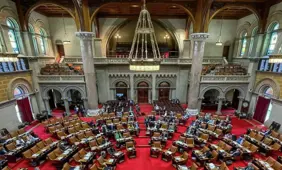Study Shows New German Gambling Laws Will Send Players Offshore

A just published study suggests that Germany’s planned gambling restrictions and taxes could see as much as 40% of players turn to offshore operators, and at the same time counteract player protection efforts.
The Handelsblatt Research Institute carried out the study on behalf of online trade body Eco. Professor Dr. Bert Rürup, president of the Handelsblatt Research Institute, explained that the data showed that online casino players are very sensitive to change. Therefore, if there were changes to the online casino where they have been playing for many years, for instance the introduction of lower betting limits, then more than 40% of players would look for a site that retained the conditions that they are used to.
In regards to the amendments to Germany’s Race Betting and Lottery Act, which would set a turnover tax of 5.3% for online slots and poker, Dr. Rürup said, “The taxes planned by the federal states are extremely high in European and international comparison. A 5.3% tax on stakes could make legal and licensed offers very unattractive.”
The Bundestag’s Finance Committee has already heard the amendment to the Act and two further committees, Sport and Legal Affairs and Consumer Protection, are considering it. It has come in for major opposition with the Düsseldorf Institute for Competition Economics (DICE) saying that it could “doom” re-regulation.
Furthermore, the European Gaming and Betting Association (EGBA) filed a formal state aid complaint to the European Commission against the Bundesrat in regards to the proposed 5.3% tax, and a similar complained was filed by Deutscher Sportwettenverband (DSWV). They both claim that the tax rates are illegal state aid as they favor the land-based industry.
Related:
Many industry professionals are also concerned about the proposed tax. For instance, Jakub Kolomicenko the head of legal at Endorphina recently explained that the tax will effectively prevent operators from making money from virtual slots:

Considering that the average RTP (return to player) rate from slot games is 96%, such taxation would mean that the operators would be losing money on slots. Actually, to make the revenue from slots equal as without the proposed tax, the RTP of the slots would have to be reduced. And here we come back to the attractivity of games for players. Why would you play a game with a lower RTP when, just a click away, you can play the very same game with a higher RTP, only in an unregulated casino? This is why many experts are afraid that such taxation would drive players to the black market, which is very risky, especially if the jurisdiction is just opening.
More Regulation News
RELATED TOPICS: Regulation
Most Read
Must Read
 Interviews
Interviews
Sweepstakes Casinos: Thriving in an Ever-Changing Industry – Interview with Attorney Stephen C. Piepgrass
Feb 17, 2025 Interviews
Interviews






Review this New Post
Leave a Comment
User Comments
Comments for Study Shows New German Gambling Laws Will Send Players Offshore